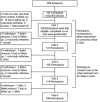Provider-focused intervention increases adherence-related dialogue but does not improve antiretroviral therapy adherence in persons with HIV
- PMID: 20048680
- PMCID: PMC2832106
- DOI: 10.1097/QAI.0b013e3181c7a245
Provider-focused intervention increases adherence-related dialogue but does not improve antiretroviral therapy adherence in persons with HIV
Abstract
Background: Physicians' limited knowledge of patients' antiretroviral adherence may reduce their ability to perform effective adherence counseling.
Methods: We conducted a randomized, cross-over study of an intervention to improve physicians' knowledge of patients' antiretroviral adherence. The intervention was a report given to the physician before a routine office visit that included data on Medication Event Monitoring System and self-reported data on antiretroviral adherence, patients' beliefs about antiretroviral therapy, reasons for missed doses, alcohol and drug use, and depression. We audio recorded 1 intervention and 1 control visit for each patient to analyze differences in adherence-related dialogue.
Results: One hundred fifty-six patients were randomized, and 106 completed all 5 study visits. Paired audio recorded visits were available for 58 patients. Using a linear regression model that adjusted for site and baseline Medication Event Monitoring System adherence, adherence after intervention visits did not differ significantly from control visits (2.0% higher, P = 0.31, 95% confidence interval: -1.95% to 5.9%). There was a trend toward more total adherence-related utterances (median of 76 vs. 49.5, P = 0.07) and a significant increase in utterances about the current regimen (median of 51.5 vs. 32.5, P = 0.0002) in intervention compared with control visits. However, less than 10% of adherence-related utterances were classified as "problem solving" in content, and one third of physicians' problem-solving utterances were directive in nature.
Conclusions: Receipt of a detailed report before clinic visits containing data about adherence and other factors did not improve patients' antiretroviral adherence. Analyses of patient-provider dialogue suggests that providers who care for persons with HIV may benefit from training in adherence counseling techniques.
Figures
References
-
- Palella FJJ, Delaney KM, Moorman AC, et al. Declining morbidity and mortality among patients with advanced human immunodeficiency virus infection. HIV Outpatient Study Investigators. N Engl J Med. 1998;338(13):853–860. - PubMed
-
- Hogg RS, Heath KV, Yip B, et al. Improved survival among HIV-infected individuals following initiation of antiretroviral therapy. JAMA. 1998;279(6):450–454. - PubMed
-
- Ledergerber B, Egger M, Opravil M, et al. Clinical progression and virological failure on highly active antiretroviral therapy in HIV-1 patients: a prospective cohort study. Swiss HIV Cohort Study. Lancet. 1999;353(9156):863–868. - PubMed
-
- Marins JR, Jamal LF, Chen SY, et al. Dramatic improvement in survival among adult Brazilian AIDS patients. AIDS. 2003;17(11):1675–1682. - PubMed
Publication types
MeSH terms
Substances
Grants and funding
LinkOut - more resources
Full Text Sources
Medical




